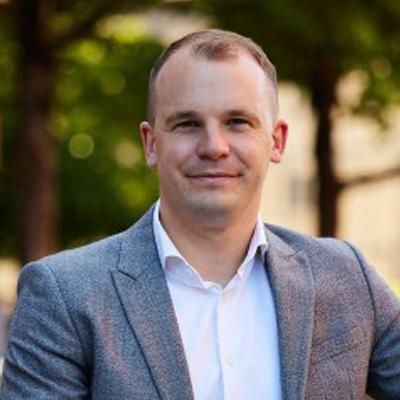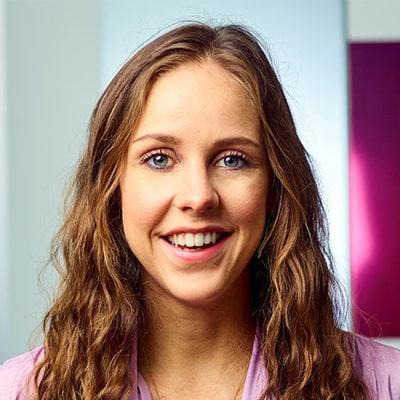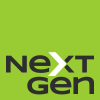Diary of a PLSA Conference first-timer: Get the inside scoop from NextGen member, James Craven!

James Craven, NextGen member
Every year, the picturesque city of Edinburgh hosts the highlight of the pension fund investing calendar. With nearly 14 years supporting the industry, I’ve always enjoyed in following the event’s happenings online – immersing myself in the lively LinkedIn discussions, digesting video snippets of engaging talks, and relishing the stories shared by industry contacts in the weeks that follow.
But this year, this year was different. I’ve been a fan of the fabulous folk at NextGen Pensions for some time and as a firm member of the DC generation, I’m acutely aware that the majority of my peer group aren’t saving enough to retire. We’re the YOLO generation that seems to forget that the idiom cuts both ways and while the industry is rightfully focussed on consolidation, navigating uncertain markets and ESG, the DC savers retirement timebomb ticks away in the background. NextGen exists to encourage new thinking, new ideas and new leaders in the sector and that’s incredibly important if we’re to cut the right coloured wire.
One Thursday afternoon, an unexpected email landed in my inbox: NextGen had a limited number of spare tickets available, with entry requiring nothing more than a written request. With a cautious optimism and a hint of excitement (embracing the Del Boy mantra that’s always served me well) I penned my application. The following day, they wrote back and…result! I’d been selected. Bags packed and off I went.
For those embarking on their maiden voyage to the PLSA Investment Conference, what can you expect?
Size and Scale: Prepare to be greeted by the grandeur of the conference! As a newcomer I was pleasantly surprised by the number of stands, the frequency of the talks and seminars and the ample games/sweets/competitions/giraffes to draw you over to the various exhibitors. The atmosphere brims with enthusiasm and opportunity, offering ample chances for networking and learning.
Representation Across the Industry: The conference presents a broad selection of people from all corners of the pensions world. From influential CEOs to diligent trustees and the indispensable service providers (admin, asset management, advice etc.), attendees converge to exchange ideas and insights. While progress toward improving DEIB in the industry is ongoing, walking around the conference hall, the strides made in recent years are evident.
Everyone is Welcome: For those that don’t know me, I run a recruitment firm called IGA Talent. That means that half of my job plays out in plain view (helping companies find great people) and the other half happens in private (helping great people find new companies). Regardless, the conference is an extremely welcoming place and I found people to be very generous with their time. There is no shortage of interesting people to talk with, who are happy to accommodate all perspectives, knowledge levels and backgrounds.
The Passion is Palpable: Amidst the complex challenges facing the pensions industry, from structural reforms to sustainability considerations, a shared passion for delivering positive outcomes for members prevails. Collaboration and innovation are not merely buzzwords but tangible forces driving progress, even among competitors.
People Have a Lot of Fun: Don’t rush to leave when the clock strikes six—the conference transitions into an evening of informal networking. Discussions spill over into Edinburgh’s charming bars and eateries, and it’s great fun!
In summary, the premier event of pension fund investing offers not only a platform for industry discourse but also a vibrant celebration of collaboration, inclusivity, and shared dedication. It’s a very important event that has a clear role to play in continuing to secure the financial future of the UK in both the DB and post DB environments.
First time attending the PLSA Conference? Get the inside scoop from NextGen member, Ellie Rowe!

Ellie Rowe, Senior Associate at Independent Governance Group
In the heart of 2023, against the backdrop of a century’s journey, I had the privilege of stepping into the world of pensions and lifetime savings at the Pensions and Lifetime Savings Association’s (PLSA) Annual Conference. As the PLSA celebrated its 100th year, this conference felt like more than an event; it was a time capsule of knowledge, innovation, and connection, echoing the past while guiding us toward a future of financial security and retirement dreams. Join me on this immersive journey as we delve into my inaugural experience at the PLSA Annual Conference, where exhibitions sparkled, fireside chats ignited insights, and plenary talks painted a vision of financial stability. Buckle up; we’re about to embark on a memorable odyssey through the realm of pensions and lifelong financial well-being.
Use of technology and AI
Full disclosure – I didn’t write the first paragraph above. ChatGPT did. One of the key themes running through the conference this year, regarding the future of the industry, was the use of technology, in particular AI. We were encouraged to try and understand AI more – many of us had heard of and seen ChatGPT used, but few had ever tried to use it. So, I have now tried it. After giving it a few bullet points about the conference (ChatGPT knowledge is limited to information available up to September 2021), the AI technology provided me with a full review of the event, and the opening paragraph above is a copy of what it provided. The language it used is creative and it paints a vivid picture, which isn’t far from being accurate, although “exhibitions sparkled” might be a bit much!
Linked to the theme of ‘use of technology’, the opening plenary talk this year, by Professor Noreena Hertz, included a reference to “Generation K”. Those born within the years 1997 – 2007, and the common traits they have. I, along with I’m sure other NextGen members, am a member of this Generation K. Professor Hertz talked about how we came of age with the iPhone and spend an average of 8 hours a day on our phones; how we grew up in the shadow of the 2008 financial crash and were heavily impacted by the 2020 Covid crisis, including the economic impact; and how we had always been aware of existential threats with shootings, terrorism, wars and Climate events heightening fears during our lifetime.
Generation K
The “K” stands for Katniss Everdeen, reflecting the dystopian, harsh society that we may perceive of the world. Generation K was thought to be more anxious, more aware of global issues, and more likely to be financially cautious or prudent, believing that we will be poorer than our parents were before us.
Professor Hertz posited that the pensions industry needs to rise to meet the challenge of meeting this generation where they are at – namely Instagram, TikTok, and even the Metaverse. This thought was discussed by many at the social events during the conference and there were differing views raised. For example, if this is the generation that struggles to connect in person, does ‘meeting them where they are at’ perpetuate the problem rather than help to support the generation where 8 in 10 people feel lonely?
Development and opportunities for learning
From my interactions with others at the conference, I think I can safely say that I was one of very few people from Generation K present at the conference this year. Those who I spoke to, lamented that there used to be far more younger people attending, and that these conferences were how people got to know others in the industry and develop their careers. I would like to thank the PLSA and NextGen for providing me with the opportunity to attend the conference free of charge. Perhaps with NextGen continuing to create partnerships with influential organisations like the PLSA we will continue to see the number of young people attending the conference grow.
The PLSA conference was highly informative, and would certainly support younger pensions professionals in the industry in their development. The talks were interesting and relevant, always looking at the current activities and work still to be done, as well as the more aspirational future plans in the industry. The exhibition was busy and full of different people to talk to. There were games to play, good food provided, and freebies to receive, but mostly, the exhibition provides value to the attendees by offering opportunity to directly discuss any questions you have from the talks you have heard or from your work in general.
Social events
The social events were also very helpful for these kind of conversations, as well as to have more general getting-to-know-you chats with suppliers and Trustees and others in the industry.
The PLSA conference dinner on Wednesday night was a great example of this, with lots of opportunity to talk to the people on your table. There was no seating plan, so attending alone meant I had a random selection of people choosing to join my table. We had great conversations and lovely food throughout the evening.
The after-dinner speaker was Dominic Sandbrook, British historian, author, columnist and television presenter, known to me through his podcast ‘The Rest is History’. He was very entertaining and gave lots of examples of similarities between the world we live in today, and what life was like back in 1923 when the first PLSA conference took place – he compared the Spanish Flu in 1912 with Covid-19, and commented on Manchester United’s poor performance in the Premier League then and now!
Let’s all go!
Ultimately, the PLSA conference might seem daunting, especially attending on your own, but it can be well worth it, especially if you can prepare some thoughts in advance on what you want to get out of it, people you might want to chat to, and how you will manage to get enough sleep with three full days of talks and social events in the evenings! I would encourage younger people in the industry to go as soon as they have the opportunity, especially to get Generation K in the room, where we are being talked about!
Six easy ways to enhance your employee onboarding process

Charlotte Bailey
Charlotte Bailey provides some practical tips on who to build better onboarding processes
NextGen’s first monthly column for Professional Pensions looks at how to help all employees get off to a flying start.
This time of year is often one for reflecting and setting resolutions. For NextGen, the start of 2024 also brought with it a new chair, giving us all the more reason to pause and consider where we should be focusing our efforts over the coming months.
Our new chair, Matt Dodds, hit the nail on the head when he said that, “to make the biggest possible difference, we need to have even more industry leaders and decision makers championing the benefits of diversity, becoming active advocates for the next generation and helping remove some of the barriers to progression that still exist, often unintentionally”.
This is why, throughout 2024 and beyond, our focus will be on developing the training, networking and mentoring on offer for individuals, but also seeking to provide practical support to companies that want to help build a smarter, wiser, more productive, innovative and creative pensions industry.
And with now being a time that many individuals start new jobs, where better to start than looking at onboarding processes?
Done well, onboarding can make new employees feel welcomed and valued from day one, which can make all the difference to their future career both within an organisation and the pensions industry at large.
Below, we set out our top tips for onboarding in a way that supports the retention of diverse individuals in the pensions industry.
- Say ‘no’ to the tick box approach: We don’t dispute that compliance and form-filling is a necessary part of the onboarding process. However, let’s step away from the tick box approach and use the induction process as an opportunity to engage with new employees through interactive and engaging sessions. We suggest that companies put in place a detailed onboarding plan which includes introductory sessions with the different teams in the Company, regular informal catch ups with line managers and buddies, panel discussions with different stakeholders and a range of social events.
- Communicate your culture: Onboarding is an excellent opportunity to signal the inclusiveness of the company’s culture to new employees. Make sure you’re signposting them towards information relating to the organisation’s history, the culture they aspire towards, daily operations, learning resources and growth opportunities. For some companies, it will be important to consider whether the culture is truly inclusive to begin with. The process of designing, reviewing and changing a company culture in line with EDI objectives is something we explored at length in our 2022 report, Retaining the ‘NextGen’.
- Encourage networking: The greater the flexibility offered in the first few months, the more time individuals have to form organic working relationships. New joiners should be encouraged to build internal connections, and established staff from across the business should be encouraged to reach out to new starters to make introductions and help them to feel welcome. The more stakeholders that you can get involved, the better.
- Ensure appropriate supervision: A particularly crucial relationship for all employees to establish is one with their line manager. Companies should carefully consider the capability of managers, assign this role to suitable individuals only and offer appropriate training and support to ensure they can carry out the role effectively.
- Implement a ‘buddy’ system: A ‘buddy’ system can be an effective way for information to be shared between the new employee and a ‘buddy’. The system should encourage the new employee to share any project management tips, tools, knowledge and techniques that they have learned from previous work experience, whilst providing the employee with the opportunity to learn more about the company.
- Don’t rush it: Successful onboarding doesn’t happen overnight. Give your new recruits time to understand the organisation and form working relationships. Likewise, encourage your established staff to be a part of the onboarding process by giving them the required time and flexibility to take on the additional responsibilities of being a line manager or ‘buddy’, alongside their day job.
Every organisation’s onboarding process will differ depending on their line of work and policies, and what works for one company or new employee might not make sense for another. But these top tips should provide good food for thought on how to help all employees in get off to a flying start.
Charlotte Bailey is deputy chair of NextGen’s research and insights sub-committee.
PRIVACY AND COOKIE POLICY
We use cookies on this website to analyse it's use.
By continuing to use this site, you agree to the use of cookies.
See our Privacy Policy.
